The other day I came upon a script of a VOA story that I had put together nine years ago. It was entitled, “Christmas Memories,” and it wasn’t a story so much as stories, warm reminiscences told in thin and sometimes crackly voices by men and women who lived in retirement homes — they used to call them “old-folks’ homes” — in the Washington, D.C. area.
Some of their backs were bowed, their gaits a shuffle, their hair turned thin and silver or tinted blue. Brothers and sisters and old playmates were gone. Names and dates and adventures were hard to pull from the fogbank of time.
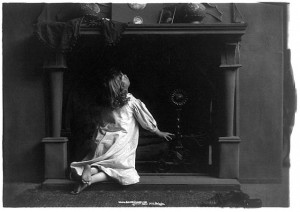
A little girl wonders whether this is where Santa lives. I’ve picked just old-timey photos to illustrate this posting, in keeping with the times in which the elderly folks in my story enjoyed Christmas as kids. (Library of Congress)
But Christmas magic refreshed the child in those who played and prayed on that Christian holiday as little ones, long ago. The very mention of Christmas brought a shy smile, a twinkle of recollection — even, with a little prompting, a carol that they once sang heartily while gathered with family and friends around the piano.
No doubt many of the people whom I met that day are now gone, too. But their words endure for millions of others, me included, who treasure Christmas as much for the memories it leaves as for the delights of the day. So I thought you’d like to read some of those words and perhaps take a moment, too, to think back, wistfully, to warm childhood moments, whether or not the memories are triggered by the Christmas season.
Lawrence Friel was five when his mother died in the terrible influenza epidemic of 1918. His father worked nights as a locomotive mechanic in the sooty coal town of Connellsville, Pennsylvania.
“I always wanted a wheelbarrow,” he told me. “I don’t know why, ‘cause I didn’t like workin’.” He laughed heartily here. “Always wanted a drum because I liked to make noise. And I got the wheelbarrow. That was a happy Christmas morning. And I got that drum at the same time. ‘Course I always believed in Santa Claus, hearing all that noise of Dad bringing that wheelbarrow in late at night. I guess it did snow that Christmas. You know, everybody looks for snow on Christmas to satisfy Santa Claus.
“We always thought Santa brought the snow with him.”
“Did you miss your mom that Christmas?” I asked him.
“Oh, my goodness, yes. I didn’t know what a mom was. I still miss my Mom today. I’m 89 years old.” And he laughed robustly again.
Eva Eden was 97 years old when we spoke. One of four children, she grew up near her senior-citizen residence in the Georgetown section of Washington. Her father, a bridge-builder, and her mother would sneak up to the attic on Christmas eve to get the family’s presents and the Christmas ornaments. When Eva, her sister, and two brothers came down Christmas morning, they found a whole snowy village surrounding the decorated tree.
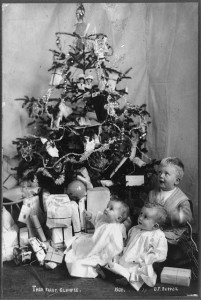
Not all trees that “Santa Claus put up” were elegant, but that was never the point. (Library of Congress)
“Santa Claus put it up. How do you think it got there if he didn’t put it up?” And she, too, chuckled mirthfully.
“Were there lights on the tree?” I inquired.
“No. It was the era before there were electric lights on a tree.”
“Candles?”
“Heavens no!!! Burn the house down?” More laughter.
I asked her if she had ever seen Santa Claus.
“Of course not,” she replied with a harumph. “He was secret. You know, the gifts are all a surprise. It’s nice.”
Her favorite carol?”
“Oh, gosh. ‘It Came Upon a Midnight Clear.’ That glorious song of old.”
Then age 95, Wilson Cowan had long retired as a federal court judge. The son of a country grocer, he grew up near Waco, Texas.
“Christmas morning — I remember one morning,” he told me, his head cocked upward and his eyes squinted as if squeezing out the image. “I woke up early and saw my dad creeping into the room, you know, bringing Christmas presents. I was only about five years old.”
“What did you think about that?” I said.
“Well, I was kinda surprised, lookin’ for Santy Claus.”
And let down, no doubt.
I asked him what he got for Christmas as a boy.
“We’d always get some fruit, like oranges. I got my first long-pants suit for Christmas one year. That was a real Christmas: my first long-pants suit.”
Toys?
“Tinkertoys were my favorite. Wooden tinkertoys you put together with sticks, you know.”
“Do you still like Christmas?” I asked him.
“Oh, yes, it’s a great holiday. I don’t have many left, but I’m gonna have a few.”
Ella Berdhaus told me she was “either 58 or 59.” Then she winked and said, “Make that a HUNDRED-58.” In truth, she was somewhere between those ages. Daughter of a liquor-store owner who died when she was two, she said her grandmother helped raise her.
And in the Berdhaus family, Christmas meant lots of time in church. “It was very important. The whole family was Catholic, and most of our friends were. Down on the corner there was a church . . . what do you call it? A Protestant church. And my grandmother even let us go to their Christmas party up there, which a lot of people, a lot of Catholic people at that time, when I was nine or ten years old, would not let you dare even step into the place. But she said, ‘Why, that’s not right, ‘cause God up there, he’s just the same at that church up there as he is at ours. And you might as well get it into your head.’ That’s the kind of person she was.”
Eloise Waite, who said she was “80-something,” spent her professional life working for the American Red Cross, eventually becoming a vice president. She grew up on the border between Canadian British Columbia and the U.S. state of Montana. Her dad was a Canadian cattle rancher, but her mom kept her and her sister in a winter house in Montana, where getting to school though the snow was easier.
But it was still plenty wintry for Christmas. “We could hardly wait to get up. A number of times mother had to send us back to bed, because we got up too early.” She gave a little chortle.
“And did your dad play Santa Claus?” I asked her. “No, I don’t think we had any Santa Claus nonsense.”
“Yet it was a special holiday, nonetheless?”
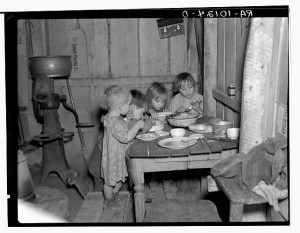
This Christmas dinner, in the Pauley family’s house near Smithfield, Iowa, was anything BUT elegant. It consisted of potatoes, cabbage, and a pie. (Library of Congress)
“Oh, it was a special holiday indeed, because my parents took particular care to see that it was a festive event. And we were invited out to dinner, and we had friends in to dinner. My father sat at the head of the table and carved the turkey, and our service was very elegant.”
And there were no worries about a white Christmas.
“Snow? You don’t know anything about snow until you’ve lived in British Columbia.”
Jean Berdan, then a spry 85, was the daughter of a Yale University English professor. She grew up with two much older sisters in New Haven, Connecticut.
“There was a green [the New England term for a public square] in the center of town. Still is. And all the office buildings would leave their lights on on Christmas Eve. We had a Christmas tree. It lived in a pot.” Wish you could hear how she said “pot” in her clipped New England accent, popping the “p”: “It lived in a pot.”
The pot lived on the porch during most of the year. “Then we would bring it into the house for Christmas. It was a very unfortunate tree, because it started out being a normal-sized little tree. But it grew. And what grew was the trunk. So you wound up with a tree that had a little bit of Christmas tree at the top, and this long, spindly trunk, like a palm tree. It was something to decorate. Tinsel and stuff. You had to wrap it around the trunk and let the balls and things hang down from long threads. It was interesting.”
Jean sang — belted out, actually — a little of her favorite carol, “The First Noel,” getting all the words, but not all the notes, just right. Then she stopped.
“Oh, I forget,” she said, with a conspiratorial smile on her face. “Well, I really don’t forget, but I think my voice is giving out!”
Some of the retirement-home residents were shy about talking about Christmas, fearing that their memories would fail them. But Christmas carols came to mind more easily. So long as I promised to sing along, I was able to coax 82-year-old Ruth Steiner, the daughter of a Virginia peanut farmer who spent a long career as a registered nurse, into singing her favorite.
“Oh little town of Bethlehem,” we sang softly together. It had been one of my favorites as a child, too. “How still we see thee lie.”
When Ruth faltered, we switched to a perky rendition of “Jingle Bells.” “Oh what fun it is to ride in a one-horse open sleigh,” we sang. And then Ruth told me how much fun it was, indeed.
Margo Kranz, who was then 78, grew up on New York’s Long Island and spent much of her career as a South American specialist for the U.S. Agency for International Development. Her mother was a singer, and Margo often accompanied her on the piano. She later played the organ in church, and it was she who organized the first caroling at her retirement home.
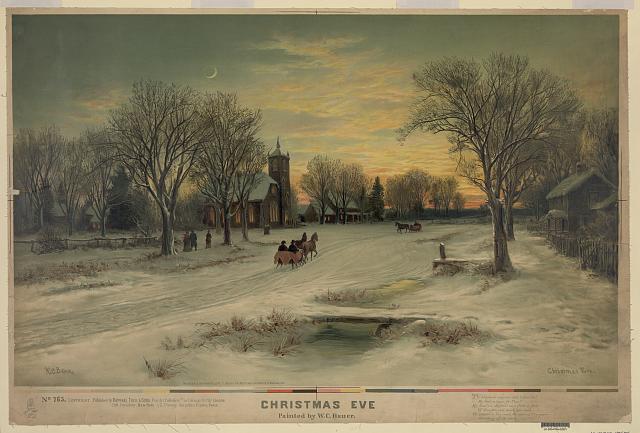
And another Christmas Eve view. (Library of Congress)
“I thought it might add a little Christmas spirit to the place,” she told me, drolly, as if a little spirit was certainly in order to perk up their sometimes-lonely days. “So I had arranged to have some song sheets made up to sing. And then I had a friend here who is a former choir singer. And I think it’s easier to do carols if somebody plays and the other person leads the group.”
“How did it go?” I asked.
“Very well. As the half-hour went on, they got better and better. So I told them eventually we were going to have a choir here.”
And so they did. She gathered her small and graying flock of singers, sounded a pitch pipe, and off they went on “Oh Come, Oh Come, Emanuel.”
One of the carolers was 88-year-old Cora Grannis, a long-retired social worker, who broke out into a solo:
Deck the halls with boughs of holly.
Fa-la-la-la-la, la-la-la-la.
’Tis the season to be jolly.
Fa-la-la, la-la-la, la-la-la.
“That’s about all I can remember.”
Cora was more of a storyteller than a singer. The daughter of a mathematics professor, she was an only child, growing up in college towns in Illinois and Colorado.
“The first Christmas I remember is when I was four years old,” she said. “That was in 1917. Mother couldn’t afford anything very elaborate. But she got a Christmas tree. And she bought some bright-colored yarns and threaded the yarns into a darning needle. On several of them, she put pumpkin seeds. And on some of them she strung popcorn. That made it real pretty.
“I think the thing that interested me most that Christmas was when Mother had this lovely little doll’s table and a little chair and let me sit down there. She had all these doll’s dishes and a couple of little candles. And I just was transfixed, I was so happy.”
And happy again, thinking about it.
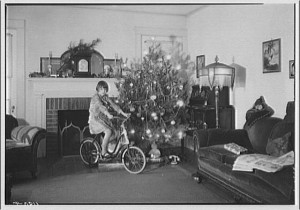
Not too many presents were opened in this house, it would appear. But one was probably especially treasured. (Library of Congress)
“I can remember when I was still quite small,” she continued without any prodding. “I was cutting paper dolls in the living room. And mother said, ‘I want you to pick up the snippers.’”
Love that word for scissors: the “snippers.”
“So I did that. And then mother took me over to the fireplace, and she hollered up the chimney and said, ‘Santy Claus, I want you to know that she picked up the snippers.’ And then she made like she was Santy Claus and said something about [here she affected a deeper voice] ‘Well, that’s very nice.’”
For sure, Cora Grannis remembered Clement Moore’s classic 1823 poem, “A Visit from Saint Nicholas.” “You bet,” she said, proudly, and she proceeded to recite it, almost word for word, and with panache.
’Twas the night before Christmas, when all through the house
Not a creature was stirring, not even a mouse.
And so on, until she got to the part where Clement Moore named Santa’s reindeer. She paused, scratched her nose the way Santa did before plunging down the chimney with gifts, and waded in, getting some of the deer’s names right:
On Don, on Comet, on Cupid, on Donner and Blitzen.
On Dancer and Pritzer. On Joaner and Vixen.
Then she headed back into the story, all the way to Santa’s exclamation ‘ere he drove out of sight: “Merry Christmas to all. And to all, a good night.”
Some of these women and men would have visitors, or get out to see relatives, for Christmas. Many would not. But snug memories from long ago kept every one of them company that Christmas Day.
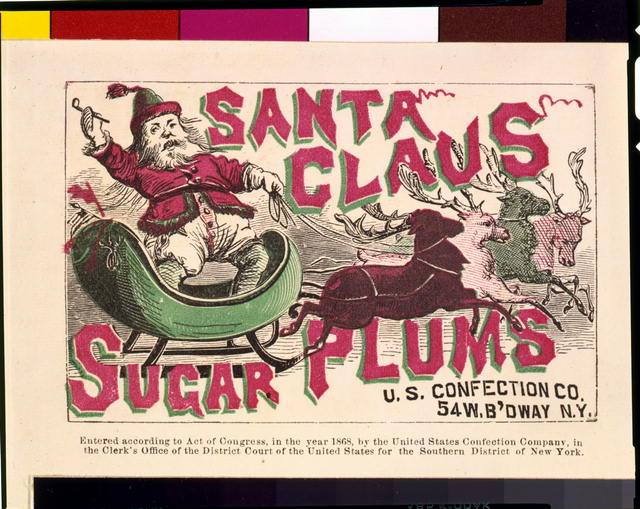
Santa and his reindeer get a whimsical treatment in this 1868 label for confections called “sugar plums,” as in the “visions of sugar plums” that danced in children’s heads in the “Night Before Christmas” poem. (Library of Congress)
Ted's Wild Words
These are a few words from this posting that you may not know. Each time, I'll tell you a little about them and also place them into a cumulative archive of "Ted's Wild Words" in the right-hand column of the home page. Just click on it there, and if there's another word that you'd like me to explain, just ask!
Harumph. A short, grumpy huff. An expression of disapproval or disdain.
Mirth. Mirth. Merriment, expressed in light, jolly laughter.
Panache. A word of French origin that describes actions taken with great flair or exaggerated flourish.
Tinsel. Long, thin strands of shiny metal, designed specifically to accentuate the glow of candles, originally, then lights, on a Christmas tree. In fancy Victorian homes, the tinsel was made of real silver, but it tarnished easily and fell out of favor. Modern tinsel is aluminum-based.

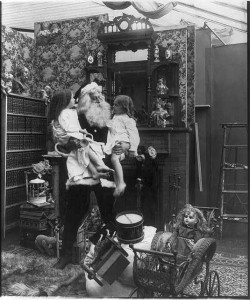
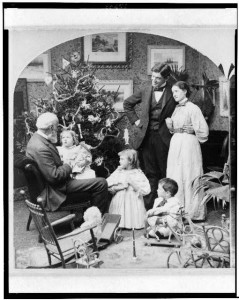
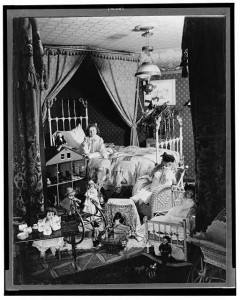
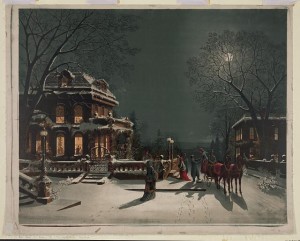
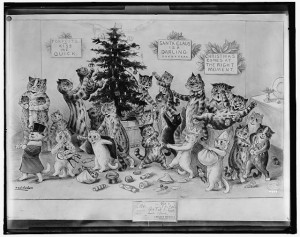

One response to “Christmases Remembered”
[…] Wonderful story telling here. […]